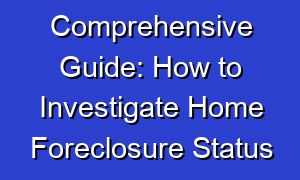Comprehensive Guide: How to Investigate Home Foreclosure Status

Summary: Investigate home foreclosure status efficiently and effectively.
Are you wondering about the foreclosure status of your home? Investigating this matter is crucial. Knowing the status can help you make informed decisions. Start by gathering all relevant documents related to your property. Look for any notices or letters from your lender. Check the public records for any foreclosure filings or notices of default. It’s also important to understand the legal process of foreclosure. Consider seeking advice from a real estate attorney. Don’t ignore any warnings or notices you receive regarding your property. Take action and investigate the home foreclosure status promptly.
| Check online public records for notice of default or lis pendens documents. |
| Contact the county clerk’s office to inquire about the property’s foreclosure status. |
| Hire a foreclosure attorney to assist with investigating the legal process. |
| Look for any foreclosure auctions scheduled in your area for the property. |
| Check with the homeowner association for any outstanding dues or foreclosure notices. |
- Review the property’s sale history and ownership records for any issues.
- Research the bank’s foreclosure process and contact them for more information.
- Consider hiring a real estate agent to help navigate the foreclosure market.
- Request a title search to uncover any liens or judgments against the property.
- Consult with a financial advisor to understand the implications of buying a foreclosed home.
Contents
- How to Determine Foreclosure Status of a Home?
- What Documents are Needed to Investigate Foreclosure Status?
- Where to Find Information on Foreclosure Status?
- How to Identify Pre-Foreclosure Status of a Home?
- What Are the Consequences of Foreclosure Status?
- How to Stop Foreclosure Proceedings?
- Can Foreclosure Status Be Appealed?
- What Are the Steps to Investigate Foreclosure Status?
- How to Determine Foreclosure Auction Status?
- What Does Foreclosure Redemption Period Mean?
- How to Verify Foreclosure Sale Status?
- Can a Homeowner Challenge Foreclosure Status?
- What Are the Legal Rights in Foreclosure Proceedings?
- How to Research Foreclosure Options for Homeowners?
How to Determine Foreclosure Status of a Home?
To investigate the foreclosure status of a home, start by checking public records or contacting the lender.
What Documents are Needed to Investigate Foreclosure Status?
Documents such as deeds, mortgage agreements, and notice of default can help in investigating foreclosure status.
Where to Find Information on Foreclosure Status?
Check with the county clerk’s office, online databases, or hire a foreclosure attorney for information.
How to Identify Pre-Foreclosure Status of a Home?
Notice of default or lis pendens filings indicate a home is in pre-foreclosure.
What Are the Consequences of Foreclosure Status?
Foreclosure can lead to eviction, credit damage, and liens on the property.
How to Stop Foreclosure Proceedings?
You can stop foreclosure by negotiating with the lender, loan modification, or selling the property.
Can Foreclosure Status Be Appealed?
You can appeal foreclosure status by hiring a foreclosure attorney and presenting evidence.
What Are the Steps to Investigate Foreclosure Status?
Steps include checking public records, contacting the lender, and consulting a real estate professional.
How to Determine Foreclosure Auction Status?
Check with the county sheriff’s office or trustee for foreclosure auction status.
What Does Foreclosure Redemption Period Mean?
Foreclosure redemption period allows homeowners to reclaim the property before auction.
How to Verify Foreclosure Sale Status?
Verify foreclosure sale status by checking with the county clerk or online databases.
Can a Homeowner Challenge Foreclosure Status?
A homeowner can challenge foreclosure status by filing a lawsuit and presenting evidence.
What Are the Legal Rights in Foreclosure Proceedings?
Legal rights include right to cure, right to redemption, and right to eviction notice.
How to Research Foreclosure Options for Homeowners?
Research foreclosure options such as short sale, deed in lieu, or loan modification.

















